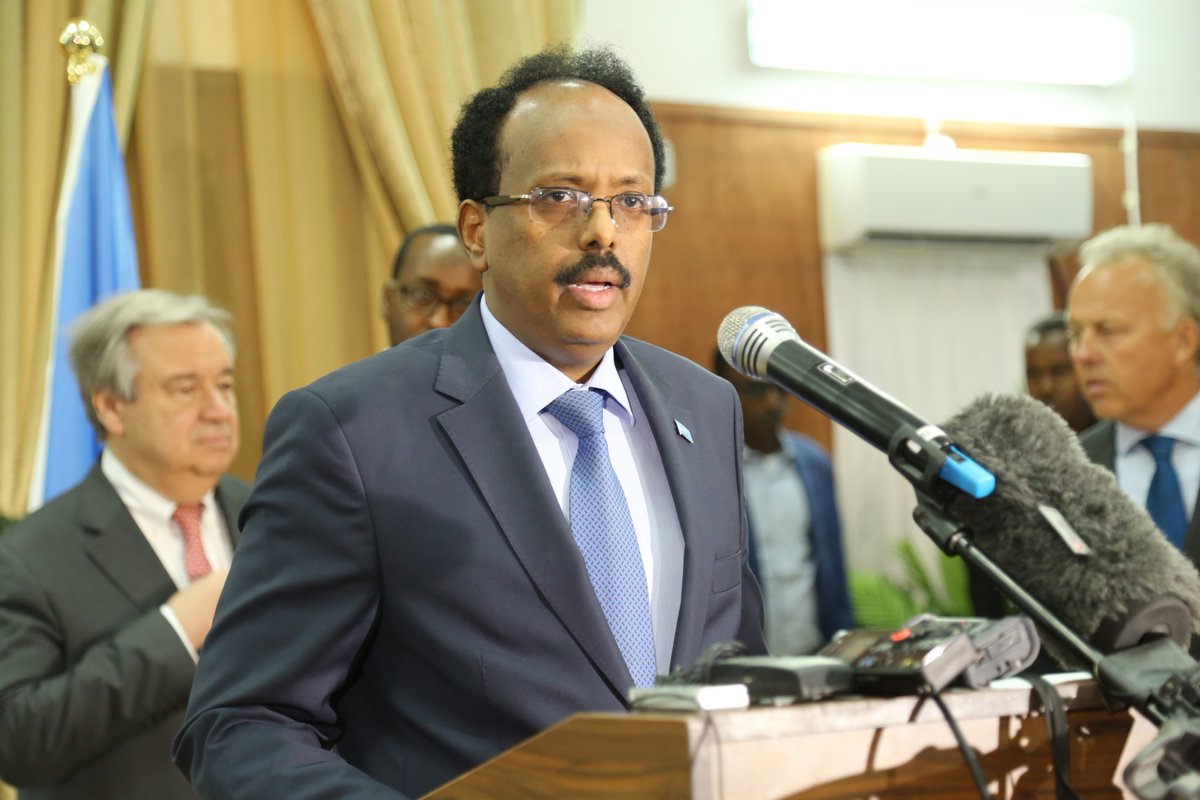THE INTERVIEW: Navigating the foreign policy maze for Farmaajo administration

That umbilical cord of dependency must be cut– Abukar

AS PRESIDENT MOHAMED FARMAAJO charts the course of his next four years as the country’s chief executive, a host of challenges already confront him ranging from the deadly drought ravaging various parts of the country to insecurity, economic recovery among others.
Drafting his administration’s foreign policy is equally an issue at hand calling for the president’s attention as Somalia establishes its place in the community of nations. Goobjoog News editor talked to former Somali special envoy to the US and foreign policy expert Abukar Arman on critical foreign policy areas of interest for the new administration.
Goobjoog News (GN): From the regional front, what foreign policy direction do you think the new administration should or will seek to pursue particularly in its relations with immediate neighbours-Ethiopia and Kenya?
Abukar: The new administration is mindful that it is in Somalia’s existential best interest to pursue an ‘assertive but not hostile’ policy vis a vis our neighbors.
GN: Ethiopia has for a long time being seen as having a hand in influencing Somalia’s foreign policy and by extension national agenda. Do you think the new administration could seek to reset the button and chart its own course?
I don’t think it has any other choice; Sustainability of our nationhood depends on it. The alternative is to be lured as others into the same political minefield. So, the message has to be unequivocally clear: There is a new Sheriff in town. Interference and micromanagement of Somalia’s political affairs is a thing of the past. And if our neighbor is not willing to respect these wishes, the new administration would have no choice but to put moratorium on its IGAD membership.
GN: Of what foreign policy import do you think the maritime dispute between Kenya and Somalia portends now that the ICJ has Okayed a full hearing?
Let me first say this: In terms of its exploitative nature and the corrupt process that facilitated the deal, that bone of contention is on a par with the Soma Oil and Gas deal. I am confident a lot will come to the surface at the ICJ hearing. And so long as Kenya insists on its current position and establish ‘facts on the ground’ this issue could poison the relationship between the two countries.
GN: As an observer on Somalia and foreign policy, you have severally and consistently opined that Somalia’s foreign policy and indeed its national discourse is crafted and implemented in foreign capitals. Going forward, a) Do you think the Farmaajo administration will escape the same? b) How can Somalia own and shape its own course and still remain a respected actor in the international arena?
a) Whether he escapes or not will mainly depend on how deliberately he articulates his vision, how confidently he projects himself, and the clout of the strategic alliances that he forms.
b) Contrary to the common perception, Somalia does not have the respect that it once enjoyed precisely because in its current condition all of its affairs—politically, economically, diplomatically and security wise—are outsourced to others. That umbilical cord of dependency must be cut.
GN: The relationship between Somalia and the Arab world has largely been that of a donor-recipient one and sometimes seen as effected at the level of the President and not the state. President Farmaajo’s first port of call was Saudi Arabia. Can Farmaajo seek to redefine these relations to establish a more beneficial and respectable model especially given Somalia’s membership to the OIC and Arab League?
Regardless of the façade of cohesion and solidarity, neither one of these institutions function in the way that it was envisioned to function; and the political turmoil in the Middle East has exacerbated the situation. Against that backdrop, I don’t see why President Mohamed Abdullahi (Farmaajo) would not seek to cultivate strategic partnerships with certain Islamic countries- historical friends as well as newer ones.
GN: The UK has sought to present itself as de facto port of call for Somalia within the Euro-US context and Secretary Johnson’s visit to Mogadishu last week and the May London conference could lend credence to this. How do you think Somalia (new admin) can balance its foreign policy direction within this context considering President Farmaajo’s US passport?
The new administration would have to astutely focus on what is in the best interest of Somalia and disregard all glittering generalities and dangled carrots that are the hallmark of multi-national security and development extravaganzas. They should attend the conference but not lose their sobriety. Per President Farmaajo’s “US passport,” I think it is more of a burden for both Somalia and US.
GN: The UAE’s inroads into Somalia (Berbera Port and Naval base deals) puts Somalia into a complex geo-diplomatic quandary. In drafting its foreign policy direction, how can the new administration navigate this maze given the parties at play?
Considering the complexity of the Somalia/Somaliland relations, this could prove one of the most complex issues facing the new administration. The new administration would have to handle this matter with the political sensitivity that it requires. And with regards to UAE, the new administration would have to keep its diplomatic enigma in the right rails. Leadership must navigate prudently and engage strategically.